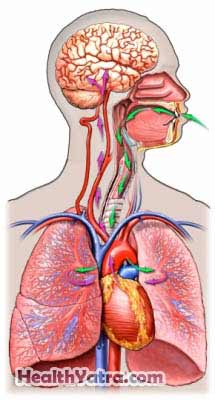Definition
Hepatic encephalopathy is a problem with the brain that is caused by liver disease. The problem may be temporary or permanent. People with a liver disease calledcirrhosis are most commonly affected.

Causes
A liver with disease cannot filter the harmful items in blood. These toxins build up in the blood, which reaches the brain and affects the brain’s ability to work properly.
Risk Factors
Factors that increase your chances of developing hepatic encephalopathy include:
- Certain conditions that affect the levels of fluids and electrolytes such as hyponatremia and hyperkalemia
- Kidney failure
- Infections
- Gastrointestinal bleeding
- Certain medicines such as sedatives and anti-epileptics
- Constipation
- Cirrhosis
- Hepatitis—infectious or autoimmune
Symptoms
In the early stages, you may not notice any symptoms. As the condition progresses, symptoms may include:
- Changes in behavior and personality
- Shortened attention span
- Depression or anxiety
- Insomnia
- Fatigue
- Forgetfulness
- Disorientation
- Slurred speech
- Tremor, particularly a flapping tremor of the hands
- Confusion
- Loss of consciousness
If you have liver problems and any of the above symptoms, call your doctor right away.
These problems can develop quickly. They may resolve when the underlying condition is reversed, but immediate treatment is needed.
Diagnosis
This condition can be serious. It can quickly become an emergency. You may need to be hospitalized. Doctors will do an exam to assess the condition of your nervous system.
To assess your liver and kidneys your doctor may order:
- Liver function tests
- Kidney function tests
- Imaging tests of the liver
Your doctor may also order tests to assess your brain and nervous system such as:
- Images of the brain with MRI scan or CT scan
- EEG to look at brain waves for evidence of encephalopathy and/or seizures
- Lumbar puncture to look for other causes of the encephalopathy
Treatment
Hospitalization and Emergency Care
The initial treatment will focus on treating and trying to reverse the underlying problems. If possible, toxins in your blood will be removed or neutralized.
Medications
Medications may be used to:
- Neutralize toxins in the intestine such as ammonia
- Prevent intestinal bacteria from creating ammonia
- Remove blood from the intestines
- Reduce ammonia production by intestinal bacteria
- Treat the condition that started the encephalopathy
- Reduce recurrence
Dietary Restrictions
Your doctor may recommend changes in your diet. Tube feeding may be needed to supply nutrients, especially in the case of coma.
Transplantation
If this condition is due to liver failure, you may need a liver transplant.
Prevention
To help reduce your chance of getting this condition, take the following steps:
- Get early treatment for liver problems.
- If you have a disease such as cirrhosis, see your doctor regularly.
- Follow your doctor’s instructions regarding medication. Avoid overdosing.
- Avoid being exposed to poisons or toxins.
- Avoid excessive alcohol.
- Do not use IV drugs.
